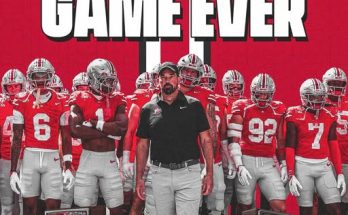The NCAA has let South Carolina’s Rahsul Faison down, dragging its feet on resolving his eligibility status and leaving him stuck in limbo without answers.
Rahsul Faison’s journey to the University of South Carolina was supposed to be a story of perseverance, grit, and eventual triumph. The kind of story that college sports is supposed to celebrate — a talented young man with the potential to contribute meaningfully to his program, both on and off the field, navigating adversity to achieve his dream. But instead of being able to focus on football, Faison now finds himself caught in a bureaucratic nightmare, thanks to what many are calling a complete failure by the NCAA to act with urgency or clarity.
Faison’s eligibility issues have become a prime example of how the NCAA’s administrative bottlenecks can derail a young athlete’s career before it even gets started. The NCAA, long criticized for being slow-moving and inconsistent in its decision-making, has once again found itself at the center of controversy. And for Faison, a player who should be preparing to wear the garnet and black in front of thousands of fans at Williams-Brice Stadium, the wait has become more than just frustrating — it’s demoralizing.
South Carolina took a chance on Faison, and he rewarded that belief with hard work and commitment. He joined the Gamecocks with every intention of competing at the highest level, throwing himself into workouts, team meetings, and academic responsibilities. The coaches and staff had confidence in his abilities and saw a young man ready to step up and contribute. What they didn’t anticipate was the roadblock from Indianapolis, where the NCAA headquarters continues to sit on his eligibility review with no clear timeline for a resolution.
The lack of transparency is perhaps the most baffling part of this entire situation. No clear reason has been provided as to why Faison’s eligibility case is taking so long. Coaches, teammates, and Faison himself remain in the dark, forced to operate in a holding pattern while decisions are made behind closed doors. And in the high-stakes world of college football, where every practice, every rep, and every snap counts, this kind of delay can have far-reaching consequences.
While eligibility cases can be complex, especially in the current era of the transfer portal, NIL deals, and revised academic standards, there’s still no excuse for the amount of time it’s taken to resolve Faison’s situation. The NCAA has had months to evaluate his case. Multiple programs have dealt with eligibility reviews this offseason, and yet somehow, this case has dragged on with no end in sight. It’s hard not to feel like Faison is being forgotten — or worse, ignored.
Meanwhile, the Gamecocks are moving forward with preparations for the season. Practices are underway. Depth charts are being shaped. Coaches are evaluating talent and finalizing their game plans. For a player like Faison, missing this window of opportunity isn’t just about playing time — it’s about missing crucial development, bonding with teammates, earning the trust of the staff, and gaining real game experience. All of that is on hold because the governing body of college athletics hasn’t prioritized getting answers.
It’s a situation that should never happen to a student-athlete. Faison did everything asked of him. He followed protocol, submitted documentation, and remained committed to the program. And yet, because of a system that often seems more focused on protecting its own red tape than helping its athletes, he’s stuck waiting, wondering if his shot will ever come.
The emotional toll cannot be overstated. Young athletes like Faison pour their energy, identity, and future into this sport. To be sidelined not due to injury, not due to performance, but because of administrative gridlock, is a bitter pill to swallow. Each day that passes without resolution erodes confidence and creates unnecessary mental stress. For someone who’s given everything to make this dream come true, the silence from the NCAA is deafening.
South Carolina head coach Shane Beamer and his staff have remained supportive, expressing public and private backing for Faison. But even their hands are tied. NCAA processes are notoriously opaque. Appeals take time. Communication is limited. And so the Gamecocks, like Faison, are left waiting for an answer that may not come until it’s too late.
This is not the first time the NCAA has mishandled an eligibility case, and unfortunately, it likely won’t be the last. But that fact doesn’t make it any easier for Faison. In a world where college sports is evolving rapidly — where athletes are finally starting to earn compensation and exert some control over their futures — the basic obligation to ensure athletes can play remains unmet.
The NCAA often claims to prioritize the welfare of student-athletes. In press releases and policy statements, they tout commitments to fairness, opportunity, and development. But actions speak louder than words, and in the case of Rahsul Faison, the inaction says it all. The failure to resolve his eligibility isn’t just a missed step; it’s a complete breakdown in serving the very individuals the organization is supposed to protect.
Fans of the Gamecocks have started to take notice, with growing calls on social media for the NCAA to provide clarity and resolution. Local media has reported on the case, echoing the sentiments of frustration and disbelief. For a program that’s striving to build momentum and foster a competitive culture, losing a promising player to administrative limbo sends the wrong message — both to current athletes and to future recruits.
What makes this more maddening is the double standard that seems to pervade NCAA decision-making. While some athletes are granted waivers or rulings within days, others — like Faison — are forced into prolonged uncertainty. There appears to be no consistency, no guiding principle that athletes and programs can rely on. And that breeds resentment. Why does one player get immediate clearance while another is sidelined for weeks or months?
If the NCAA wants to remain relevant in the modern landscape of college athletics, reform isn’t just necessary — it’s urgent. The organization can no longer afford to be reactive, unaccountable, and slow. It must implement real-time, transparent, and athlete-first processes. That means investing in personnel, improving communication, and ensuring every athlete’s case is treated with the urgency it deserves.
As it stands, Rahsul Faison remains in limbo, robbed of precious time and opportunity through no fault of his own. It’s a disgrace that should have been resolved long ago. He deserves to be on the field, earning his spot, competing with his teammates, and pursuing the dream he worked so hard to achieve. Instead, he’s watching from the sidelines, waiting for a verdict from an institution that has seemingly forgotten him.
The story of Rahsul Faison is more than just one young man’s eligibility status — it’s a mirror held up to the flaws of an organization that still struggles to put its athletes first. It’s a reminder that even in the age of progress, injustice can still occur not through malice, but through neglect. And that, in many ways, is even more damaging.
If the NCAA wants to repair its relationship with athletes and rebuild trust in its mission, it must begin by ensuring that no more stories like Faison’s unfold in silence. The clock is ticking. Lives are being affected. And the world is watching.
Rahsul Faison’s time should be now. But thanks to the NCAA, he’s left waiting for a call that never should have taken this long.



